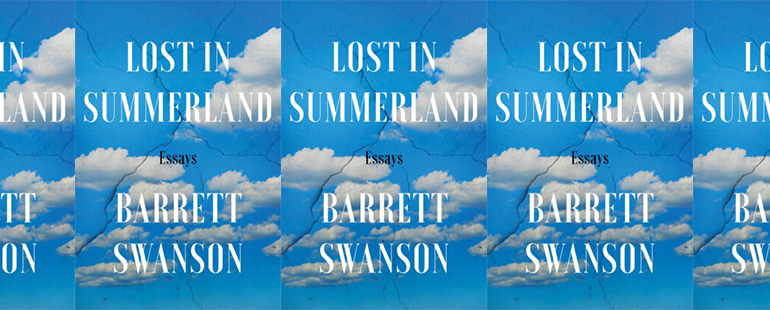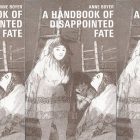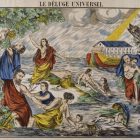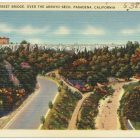Searching for an American Epistemology in Lost in Summerland

“Among friends, my quests are the subject of gentle mockery,” Barrett Swanson writes in “Church Not Made with Hands,” an essay in his debut collection, Lost in Summerland, out next week. While he’s specifically referencing his haphazard dalliances with vegetarianism, celibacy, transcendental meditation, and Effective Altruism—efforts “to imbue the deadened landscape of reality” with purpose—the sentiment also winks at the intellectual project undertaken in these essays: Swanson treks deep into conspiracy subreddits, sustainable farms, and spiritual seances in an effort to clarify a cohesive American narrative, one that examines the pervasive myopia and post-truth milieu of our time. Sans mockery, though, I found Swanson’s quests to possess a shamanistic quality, each excursion of literary reportage like a fully inflated buoy that could guide me back to a shore I’d long lost sight of.
Beyond their exhaustive intelligence, a large part of what makes Lost in Summerland’s fourteen essays so monstrously enjoyable is that they are what James Wood would call “novelistic essays.” In 2011, when writing about John Jeremiah Sullivan’s collection Pulphead, Wood posited that “the contemporary essay has for some time now been gaining energy as an escape from, or rival to, the perceived conservatism of much mainstream fiction” while also learning “from fiction (as well as from the essayistic tradition) how to structure and ration . . . narratives.” Similar to some of the great essayists in recent memory—David Foster Wallace, Zadie Smith, Elif Batuman, Wells Tower, Valeria Luiselli, and Jia Tolentino, to name only a few—Swanson is a trained fiction writer. I first encountered his work in a Pushcart Prize anthology, where his short story “Annie Radcliffe, You are Loved” rocketed me out of a mid-MFA stupor. To Wood’s point about the unerring conservatism of a lot of mainstream fiction, I too, at the time of my encounter, felt embalmed by what Wallace once identified as “Workshop Hermeticism”—short stories that are so seemingly lustrous and problem-free that they are at once impossible to critique and impossible to remember after reading. “Annie Radcliffe, You are Loved” is anything but forgettable. The story is all Saundersian flair and exuberant prose, plump with eccentric characters who induce you to feel real, serious, memorable things. Over the next few years, I occasionally returned to the piece whenever I confronted the familiar constraints of MFA fiction’s autopoetic conventions, or, even worse, the aimless and often negligent eschewal of these conventions.
Swanson, apparently, has struggled writing fiction as of late. In a recent essay for the New Republic, he claims he lost “whatever spell of optimism and self-delusion is necessary for sustained artistic creation,” and that while working on a novel he labored “under the delusion that I had something urgent to say about America, that the voltage of my dramatization might propel the reading public into a more expansive sense of justice.” In Lost in Summerland’s opening essay, “Notes From a Last Man,” Swanson further expresses this disenchantment: “I no longer had a mind for narrative, neither fictional nor memoiristic, and could not seem to plot the events of my life on some sturdy dramatic trajectory.” While good fiction has an unbridled ability to say “something urgent” about contemporary life and articulate the often inarticulable nature of being alive, I have begrudgingly begun to share Swanson’s nagging doubts that new-age fiction lags behind other mediums in “depicting structural injustice.” This is, perhaps, because most “contemporary realist fiction seems to long for the final metamorphosis of cultural legitimacy—to become a film or, worse, a ‘prestige’ mini-series,” per critic Dustin Illingworth.
Swanson seems to agree that the essay might be a sturdier form than the novel vis-à-vis exploring our country’s most pressing dilemmas. Working particularly in the tradition of Wallace and Sullivan, Lost in Summerland waltzes between the global and the local, critical theory and lived experience, philosophical musings and acutely personal insights, all in an effort to diagnose the “wearisome existence” of contemporary American life. In “Consciousness Razing,” Swanson attends a men’s group retreat that champions “emotional intelligence” and “somatic awareness” as toxic masculinity’s surest antidotes (ignoring, of course, any feminist perspective or meaningful discourse about patriarchy). But what sets the piece apart from your standard sort of journalistic reporting—essentializing the program’s ethos and profiling his fellow retreaters, etc.—is that, one, Swanson goes to great lengths to disentangle the thorny history of American masculinity and, two, he prominently asserts his authorial self as the essay’s protagonist. Barrett is “the first man to cry in Small Group” because he only slept “a total of four hours across the last two nights.” He confides in another retreater that there have been “several times throughout my life when I’ve contemplated suicide.” This literary maneuver—as Wood puts it, “the authorial self [popping] in and out of the picture, with a liberty hard to pull off in fiction”—enables Swanson to rigorously interrogate the intersection between capitalism, masculinity, and the “gnawing sense of purposelessness” pervasive in our country’s psyche, while also adding an undeniable empathetic and interpersonal dimension that satisfies a reader’s desire for emotionally specific narrative intrigue.
Most of Swanson’s essays share a similar pastiche. In “The Soldier and the Soil,” he profiles Steve Acheson, an Iraq War veteran whose antiwar activism finds form in an organic farm operation. Having taught many veterans in his undergraduate classes, Swanson seeks to square his guilt for attending college while “men and women were devoting their lives to certain fleecy abstractions that would make most of the civilians I know roll their eyes: duty, honor, and country.” Embedded with Steve for an entire summer, Swanson deconstructs “the feel-good narrative of the American war hero” and solemnly watches Steve’s farm, and sanity, teeter “on the edge of solvency.” Another instance where Swanson enmeshes politics with his personal life is in “Midwestern Gothic.” After his childhood best friend mysteriously washes up dead along the Mississippi River, Swanson nosedives into conspiracy message boards that connect his friend’s death to an elusive gang of serial killers. Apart from the essay’s grueling emotional excavations, Swanson delivers timely wisdom on the conspiratorial mindset that has enchanted the American condition since the Enlightenment. Later, in “Letter from a Target-Rich Environment,” a school shooter training for new university faculty prompts Swanson to consider how Columbine and 9/11 have infected “scores of Trump supporters who address their fellow countrymen with vile slurs and naked bigotry.” All told, there’s a hazy American portrait that coalesces in these essays, one that exposes an ominous overlap between our political and personal value systems.
For all of the intellectualizing, Swanson may be at his best as a bare-bones storyteller. One of the strongest essays in Lost in Summerland, “Okay Forever,” is about a traumatic brain injury that Swanson’s brother suffers in a fight. Here, stunning disclosures of grief, resentment, forgiveness, and heartache stain each sentence. It’s the one essay where I put my pen down and simply read, not as a critic but as a confidant in a dimly lit hospital room, hoping that Andy Swanson would wake from his coma. It’s rewarding, then, when the collection’s titular essay finds a recovered Andy receiving “dispatches from the spiritual realm,” an unlikely byproduct of his injury. Alarming his wife and family, Andy solicits his skeptical brother to accompany him to Lily Dale, a retreat for psychics and mediums. To make sense of his surroundings, Swanson embarks on a lengthy explication of Spiritualism in the United States, whose origins he credits to “a welter of epistemological disruptions—the Civil War and Darwinian Theory, the death of God and the birth of capitalism.” He claims that Spiritualism’s present popularity is due to a death in our country’s collective meaning: “The country lacked a workable epistemology, and even our most cherished pieties were wobbling or already lay in smithereens.” It is no surprise that “Lost in Summerland” is perhaps the clearest articulation of what makes Swanson such a wildly gifted writer: he entwines his novelistic knack for character and plot development with scholarly exegeses that are as captivating as they are comprehensive.
It’s difficult to express Lost in Summerland’s excellence without using tired descriptors like “urgent” and “necessary,” but, alas, the book feels both urgent and necessary. I wish my younger self had had an opportunity to read it. Shortly after I turned twenty, I fell down a lurid terrain of disillusion. After swapping my business minor for philosophy, I read Nietzsche and Derrida with a feverish passion, had writerly ambitions that I knew would likely spell a life of financial destitution, and actively rejected the Christian faith I was raised to believe in—even, at one point, tweeting, “how can anyone srsly believe in god??” Everything that was once obvious and normal suddenly showed its menacing underbelly—my God, my race, my gender, my education, my government, and especially my own twisting, circuitous thoughts. What could possibly offer salvation from this American hellscape? Nothing, I presumed. My country, per Swanson, had “exsanguinated everything” sacred in favor of profit and alternative facts. Even mindfulness had been commodified, with red-faced CEOs shouting about the virtues of being present while denying their employees’ right to health insurance. In such a world, it’s easy to slip into cynicism, to pretend like nothing matters. Merely identifying the bullshit seems like a civic duty. Swanson, though, cautions against this nihilistic complacency. By transcending “the myopia of I” in exchange for the “panorama of us,” we may start to see glimmers of light in the abyss. In a direct homage to Wallace, Lost in Summerland argues that our empathetic endurance may be one of the few ways we can “construct a church not made with hands.”



